英语词汇的奥秘(含音标)无水印版
英语词汇的奥秘智慧树知到答案章节测试2023年武昌工学院

第一章测试1.The clock struck six ______as I arrived.()A:justB:whileC:afterD:when答案:B2. a person who is an expert in law is a ___________.()A:juryB:juristC:justiceD:prejudice答案:B3.It took her a while to_______ to living alone. ()A:aidedB:adjustC:adoptD:alarm答案:B4._________ mean(s) slightly warm, sometimes in a way that is not pleasant.()A:coolB:coldC:tepidD:hot答案:C5.If you ______a problem, I will try my best to help you.()A:comeB:crossC:seeD:meet答案:D6.Justitia在拉丁语中就是“正义”的意思。
()A:对B:错答案:A7.greenhouse 是表示绿色的房子的意思。
()A:错B:对答案:A8.greenhorn 是绿色的小号。
()A:对B:错答案:B9.Fear,terror, trepidation 都表示恐惧,其中fear常用于口语交际。
()A:对B:错答案:A10.salt of the earth指世界上的盐。
()A:对B:错答案:B第二章测试1.Ex-boyfriend, foretell and post-election contain________.()A:prefixes of degree or sizeB:negative prefixesC:prefixes of time and orderD:locative prefixes答案:C2.The suffixes in words clockwise, homewards are ______.()A:adverb suffixesB:verb suffixesC:adjective suffixesD:noun suffixes答案:A3.The prefixes in words anti-government, pro-China and contraflow are _____.()A:prefixes of degree or sizeB:miscellaneous prefixesC:prefixes of time and orderD:prefixes of orientation and attitude答案:D4.The suffixes in words heighten, symbolize are ________. ()A:noun suffixesB:verb suffixesC:adverb suffixesD:adjective suffixes答案:B5.The root anim in words unanimous, animal and animate is called bound root.()A:错B:对答案:A第三章测试1.以下可以组成复合名词的一项是()。
26个英文字母的奥秘
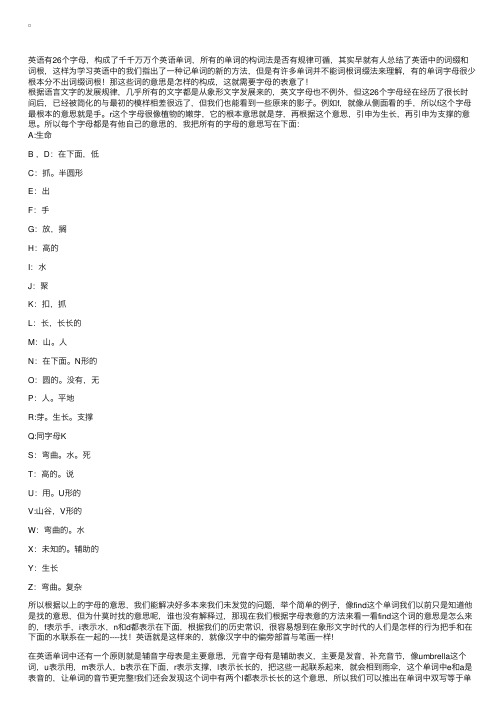
英语有26个字母,构成了千千万万个英语单词,所有的单词的构词法是否有规律可循,其实早就有⼈总结了英语中的词缀和词根,这样为学习英语中的我们指出了⼀种记单词的新的⽅法,但是有许多单词并不能词根词缀法来理解,有的单词字母很少根本分不出词缀词根!那这些词的意思是怎样的构成,这就需要字母的表意了!根据语⾔⽂字的发展规律,⼏乎所有的⽂字都是从象形⽂字发展来的,英⽂字母也不例外,但这26个字母经在经历了很长时间后,已经被简化的与最初的模样相差很远了,但我们也能看到⼀些原来的影⼦。
例如f,就像从侧⾯看的⼿,所以f这个字母最根本的意思就是⼿。
r这个字母很像植物的嫩芽,它的根本意思就是芽,再根据这个意思,引申为⽣长,再引申为⽀撑的意思。
所以每个字母都是有他⾃⼰的意思的,我把所有的字母的意思写在下⾯:A:⽣命B ,D:在下⾯,低C:抓。
半圆形E:出F:⼿G:放,搁H:⾼的I:⽔J:聚K:扣,抓L:长,长长的M:⼭。
⼈N:在下⾯。
N形的O:圆的。
没有,⽆P:⼈。
平地R:芽。
⽣长。
⽀撑Q:同字母KS:弯曲。
⽔。
死T:⾼的。
说U:⽤。
U形的V:⼭⾕,V形的W:弯曲的。
⽔X:未知的。
辅助的Y:⽣长Z:弯曲。
复杂所以根据以上的字母的意思,我们能解决好多本来我们未发觉的问题,举个简单的例⼦,像find这个单词我们以前只是知道他是找的意思,但为什莫时找的意思呢,谁也没有解释过,那现在我们根据字母表意的⽅法来看⼀看find这个词的意思是怎么来的,f表⽰⼿,i表⽰⽔,n和d都表⽰在下⾯,根据我们的历史常识,很容易想到在象形⽂字时代的⼈们是怎样的⾏为把⼿和在下⾯的⽔联系在⼀起的----找!英语就是这样来的,就像汉字中的偏旁部⾸与笔画⼀样!在英语单词中还有⼀个原则就是辅⾳字母表是主要意思,元⾳字母有是辅助表义,主要是发⾳,补充⾳节,像umbrella这个词,u表⽰⽤,m表⽰⼈,b表⽰在下⾯,r表⽰⽀撑,l表⽰长长的,把这些⼀起联系起来,就会相到⾬伞,这个单词中e和a是表⾳的,让单词的⾳节更完整!我们还会发现这个词中有两个l都表⽰长长的这个意思,所以我们可以推出在单词中双写等于单写(在⼤多数情况,不排除例外)。
英语词汇记忆奥秘

英语词汇记忆奥秘英语词汇记忆奥秘英语作为全球第一语言,在许多国家受到广泛应用,对于学习者来说,掌握英语词汇量不仅是进行英语交流的基础,也是提高语言能力的保证。
但是,学习大量的词汇却是个大难题,如何提高词汇记忆能力成了学习者们需要关注的问题。
下面将介绍一些英语词汇记忆的奥秘,旨在帮助学习者提高词汇记忆能力。
一、联想记忆法联想记忆法是一种基于联想的记忆方法,即将要记忆的信息与已有的信息联系起来,形成一个印象深刻和易于回忆的图像或场景。
在词汇记忆中,联想记忆法可以用来联想词汇的音、形、义等,例如,记忆’microphone’(麦克风)这个词,可以联想一幅人唱歌时手拿的话筒,形象生动,易被记忆。
二、视觉记忆法视觉记忆法是利用视觉形象来记忆信息的方法,以视觉图像为媒介,达到记忆的目的。
例如,几何图形可以被用来代替抽象概念,例如’rectangle’(矩形)可以想象为一个长方形,’circle’(圆)可以想象成一个圆圈。
这样可以形成一个图像记忆的系统,在记忆时逐渐建立起指定词汇的记忆模式。
三、音乐记忆法音乐记忆法是将要记忆的信息通过音乐形式与旋律相结合,达到充分记忆的目的,形成音乐记忆模式。
例如,’apple’(苹果)的三个音可以如同音乐节奏般模拟、跟唱,这会大大提高词汇记忆的精度和速度。
四、语境记忆法语境记忆法将词汇放置在语境中去记忆,例如想起’apple’(苹果)这个词时,可以联想到办公室里的办公桌上,放着一只红苹果,这样可以让学习者快速建立词汇与语境的联系,提高对特定场景下单词的灵活应用能力。
五、记忆曲线法记忆曲线法是指在知识或信息获取后,随着时间的推移,记忆曲线呈现出指数级衰减的状态。
为了保持记忆效果,需要密集的联系和复习。
例如,记住’apple’(苹果)这个单词后,每隔一段时间就需要进行复习,以保持记忆的强度。
六、运用单词家族法运用单词家族法的目的是为了更容易记忆一组相似的词汇。
例如,’persistence’(坚持),’resist’(抵抗),’assist’ (协助)等单词,都有’-sist’的相同后缀,因此可以将这些词汇认为是一组单词,帮助记忆。
英语词汇的奥秘--Chapter-Two课件

person. Top banana still is used mainly in show business. Yet the expression can also be used to describe the top person in any area.
23
Part 9: 英语幸福散文触动心灵:
What I Have Lived For 我为什么活着
❖Three passions, simple but overwhelmingly strong, have governed my life, the longing for love, the search for knowledge, and unbearable pity for the suffering of mankind. These passions like great winds, have blown me hither and thither, in a wayward course, over a great ocean of anguish, reaching to the very verge of despair.
audio-visual: [见上,visual视觉的] 视听法的,词巧计
❖abandon:vt.丢弃;放弃,抛弃; 记忆方法: a(一个) bandon(笨蛋) 笨蛋当然会被女朋友丢弃;
❖abide: vt.遵守 vt.忍受 记忆方法: a,d,c,d,e——只要把c变成I就成本单词 但是要i遵守c,i是不会
❖ A kingpin is another word for an important person. The expression
英语单词的奥秘-让你背单词快10倍的记忆法04.背四六级核心单词

充电大课堂特约讲师|maggie充电大课堂第四讲如何背四六级核心单词充电大课堂up 由下至上up holdshare holder控股人,股东household家庭主妇(v.)支持(向上托住)=supportup surgesurge增加,增长猛增up roarroar咆哮,大声疾呼The car roared down the street.汽车在街道呼啸而过。
dis turb anceturb=stir搅动打搅,心烦意乱The disturbance was repressed at last by the riot police.骚乱最终被防暴警察镇压下来。
riot骚乱She was knocked down amid the riot.她在骚乱中被撞倒在地。
turbulence颠簸Ladies and Gentlemen, we are encountering some turbulence, please fasten your seat belts and lavatories are not to be used. Thank you!女士们先生们,我们的飞机遇到不稳定气流造成颠簸,请系好安全带,洗手间暂停使用,谢谢!Lav atorylav=luv=lau冲洗洗手间,盥洗室Lav e沐浴,冲刷Lav ish丰富的,浪费的Lav ish trip豪华旅行Lav ish dinner奢华晚宴Lav ish party奢华派对De lu ge大洪水,泛滥Di lu t冲淡,稀释Lau ndry洗涤,洗衣店穿插一个圣经中的故事传说上帝先创造了天使,之后又以土块创造人类,然而神宠爱人类甚于天使,把人类放置在高于天使的地位之上。
堕天使不满能力低劣的人类较受宠爱,而群起反叛。
Seven在宗教上是个神秘的数字。
上帝用七天造亚当,取出亚当的第七根肋骨造了夏娃。
撒旦的原身是有七个头的火龙,所以共有七名堕落天使(fallen angels)被称为撒旦来到人间作恶,它们分别代表七种罪恶:七宗罪the seven deadly sins,分别是傲慢Pride,暴怒Wrath,懒惰Sloth,贪婪Greed,嫉妒Envy,饕餮Gluttony,以及淫欲Lust。
英语词汇的奥秘3

Q: antetype
A: 原型
Q: antedate
A: 比实际早的日期
Q: antestomach
A: 前胃
Q: antenuptical
A: 婚前的
Q: antecessor
A: 先行者,先驱者
Q: anti-
A: 反对、相反、防止
Q: abreast
A: 肩并肩地
Q: afoot
A: 徒步
Q: atop
A: 在顶上
Q: afire
A: 在燃烧中
Q: aback
A: 向后
Q: a- 3、
A: 3、加强意义
Q: aloud
A: 高声地
Q: awake
A: 唤醒,使醒
Q: ar-
A: 含有at,to之意,或表示加强及引申意义
Q: arrange
A: 安排,布置
Q: arrect
A: 直立的
Q: arrear
A: 在后,拖延
Q: arrive
A: 到达
Q: as-
A: 含有at,to之意或表示加强或引申意义
A: 周围,环绕
Q: circumplanetary
A: 自动旋转
Q: autobiography
A: 自传
Q: autoalarm
A: 自动报警器
Q: autosuggestion
A: 自我暗示
Q: autoinfection
A: 自体感染
Q: anto-timer
A: 自动定时器
Q: autobike
(完整word版)通过字母破解英语单词的秘密

通过字母破解英语单词的秘密人们普通认为:英语是拼音文字,因而与象形无关。
但是,实际上,即使作为拼音文字,其字母的来源也与象形有关。
根据笔者十多年的研究结果,英语中的二十六个字母每个字母都有其象形意义,而且更重要的是:这些字母的象形意义对于记忆大量的英语单词具有重要意义。
本文专门探讨英语中二十六个字母最重要的象形意义及其在英语单词记忆中的作用。
字母A a——象形人头,指男人,人头, 喻向前英语中的第一个字母a 从外形上看象一个“人头”(head).常用来指(man),所以在man(男人)一词中有a,而man的第一个字母m 象山,也代表坚强如山的男人,另外male (男性的)一词也有m和a这两个字母,而同时ale意为“麦酒”“浓啤酒”正是男人喜欢喝的酒。
a 同时仍保留“人头”的象形意义,如face(脸),f象形女性的披肩长发。
a是“人头”,女人人头上的脸才是人们最爱看的,另外在bad(坏的)一词中,也有一个人头a,这个人在b和d左右挤压下。
只剩下一个人头,自然是处于很坏(bad)的境地了。
另外,由于人向前走,头即向前倾,所以表示人“头”的a又可喻指向前,如advance(前进)。
字母B b - 象形上小下大的物品,指扫帚、木棒和大肚子,喻稳固、牢固英语字母b则象形上小下大的物品,外形上象扫帚、大头棒、大肚子、木棒等上小下大的东西,因此,我们有broom(扫帚)一词,就是一把扫帚(外形象b)放在房间(room)的旁边。
同时因为b象大棒,我们有了bat(球棒),而且beat(打)更形象地表达出挨打就是吃(eat)这个大棒(b),而且b又象大肚子的形状,所以有 bear(熊),熊的肚子够大的了。
又如born(出生的),可以这样应用这几个字母的象形意义:妈妈生孩子首先是肚子大了(b),孩子出生时肯定张开口(o)“啊……”“啊……(r的拟声)地哭,也就进入了世界这个大门(n)。
另外,由于b上小下大,显得十分稳定,故又用来比喻稳固、牢固。
词汇的奥秘
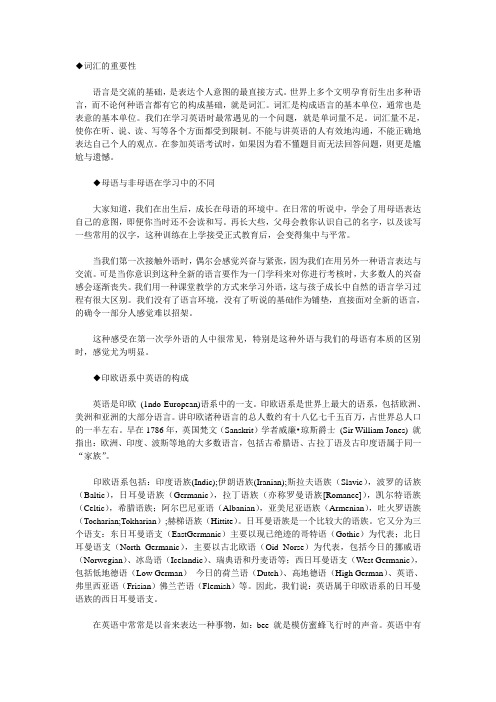
◆词汇的重要性语言是交流的基础,是表达个人意图的最直接方式。
世界上多个文明孕育衍生出多种语言,而不论何种语言都有它的构成基础,就是词汇。
词汇是构成语言的基本单位,通常也是表意的基本单位。
我们在学习英语时最常遇见的一个问题,就是单词量不足。
词汇量不足,使你在听、说、读、写等各个方面都受到限制。
不能与讲英语的人有效地沟通,不能正确地表达自己个人的观点。
在参加英语考试时,如果因为看不懂题目而无法回答问题,则更是尴尬与遗憾。
◆母语与非母语在学习中的不同大家知道,我们在出生后,成长在母语的环境中。
在日常的听说中,学会了用母语表达自己的意图,即便你当时还不会读和写。
再长大些,父母会教你认识自己的名字,以及读写一些常用的汉字,这种训练在上学接受正式教育后,会变得集中与平常。
当我们第一次接触外语时,偶尔会感觉兴奋与紧张,因为我们在用另外一种语言表达与交流。
可是当你意识到这种全新的语言要作为一门学科来对你进行考核时,大多数人的兴奋感会逐渐丧失。
我们用一种课堂教学的方式来学习外语,这与孩子成长中自然的语言学习过程有很大区别。
我们没有了语言环境,没有了听说的基础作为铺垫,直接面对全新的语言,的确令一部分人感觉难以招架。
这种感受在第一次学外语的人中很常见,特别是这种外语与我们的母语有本质的区别时,感觉尤为明显。
◆印欧语系中英语的构成英语是印欧(1ndo-European)语系中的一支。
印欧语系是世界上最大的语系,包括欧洲、美洲和亚洲的大部分语言。
讲印欧诸种语言的总人数约有十八亿七千五百万,占世界总人口的一半左右。
早在1786年,英国梵文(Sanskrit)学者威廉•琼斯爵士(Sir William Jones) 就指出:欧洲、印度、波斯等地的大多数语言,包括古希腊语、古拉丁语及古印度语属于同一“家族”。
印欧语系包括:印度语族(Indic);伊朗语族(Iranian);斯拉夫语族(Slavic),波罗的话族(Baltic),日耳曼语族(Germanic),拉丁语族(亦称罗曼语族[Romance]),凯尔特语族(Celtic),希腊语族;阿尔巴尼亚语(Albanian),亚美尼亚语族(Armenian),吐火罗语族(Tocharian;Tokharian);赫梯语族(Hittite)。
英语单词的奥秘 超级10000单词第二部分
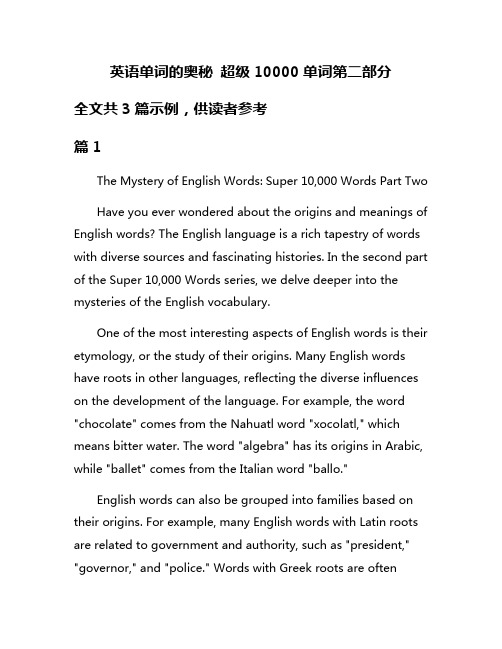
英语单词的奥秘超级10000单词第二部分全文共3篇示例,供读者参考篇1The Mystery of English Words: Super 10,000 Words Part TwoHave you ever wondered about the origins and meanings of English words? The English language is a rich tapestry of words with diverse sources and fascinating histories. In the second part of the Super 10,000 Words series, we delve deeper into the mysteries of the English vocabulary.One of the most interesting aspects of English words is their etymology, or the study of their origins. Many English words have roots in other languages, reflecting the diverse influences on the development of the language. For example, the word "chocolate" comes from the Nahuatl word "xocolatl," which means bitter water. The word "algebra" has its origins in Arabic, while "ballet" comes from the Italian word "ballo."English words can also be grouped into families based on their origins. For example, many English words with Latin roots are related to government and authority, such as "president," "governor," and "police." Words with Greek roots are oftenrelated to science and technology, such as "biology," "physics," and "telescope." Understanding the connections between words can help us to expand our vocabulary and deepen our understanding of the language.Another fascinating aspect of English words is their evolution over time. Languages are constantly changing and adapting, and English is no exception. Old English words have evolved into modern English words, with shifts in pronunciation, spelling, and meaning. For example, the Old English word "cild" has become "child" in modern English.English words can also undergo semantic shifts, where their meanings change over time. For example, the word "nice" originally meant foolish or simple in Old French, but it now means pleasant or agreeable in modern English. Understanding the history of words can help us to appreciate the complexity and richness of the English language.In addition to their origins and meanings, English words can also be categorized based on their usage and function. Nouns, verbs, adjectives, adverbs, and prepositions are just a few examples of the different types of words in English. Learning how to identify and use these different types of words can help us to communicate more effectively and accurately.English words can also be classified based on their frequency of use. The Super 10,000 Words series focuses on the most common words in the English language, which are essential for everyday communication. By mastering these words, we can improve our speaking, listening, reading, and writing skills in English.Overall, the English language is a vast and intricate system of words with endless possibilities for exploration and discovery. The Super 10,000 Words series offers a glimpse into the fascinating world of English vocabulary, uncovering the mysteries and complexities of words that shape our communication and understanding of the world. Happy exploring!篇2The Mysteries of English Words - Super 10,000 Words Part 2English is a rich and diverse language, with over a million words in its vocabulary. Each word has its own history, meaning, and usage, making the study of English words a fascinating and rewarding experience. In this second part of the series on English words, we will explore the mysteries and secrets of another 10,000 words that are essential for any English learner.1. Abandon: This word comes from the Old French word "abandoner," which means to give up or surrender. It has a negative connotation, implying a lack of care or consideration for something or someone.2. Bliss: Bliss refers to a state of extreme happiness or joy. It is often used to describe a profound sense of contentment and peace.3. Cacophony: This word describes a harsh, discordant mixture of sounds. It is often used to convey a sense of chaos or confusion.4. Debacle: Debacle refers to a sudden and complete collapse or failure. It is often used to describe a disastrous or catastrophic event.5. Eccentric: Eccentric describes someone who is unconventional or odd in behavior. It can also refer to something that is out of the ordinary or unconventional.6. Fabricate: Fabricate means to invent or concoct something, especially with the intention to deceive. It can also refer to the act of constructing or assembling something.7. Galvanize: Galvanize means to shock or excite someone into action. It can also describe the process of applying a protective layer of zinc to metal.8. Hapless: Hapless describes someone who is unlucky or unfortunate. It is often used to describe someone who is constantly facing misfortune or hardship.9. Incessant: Incessant refers to something that continues without interruption or pause. It is often used to describe a persistent or constant behavior.10. Juxtapose: Juxtapose means to place two or more things together in order to highlight their differences or similarities. It is often used to create a contrast or comparison between two elements.These are just a few examples of the fascinating and diverse words that make up the English language. By exploring the meanings and origins of these words, we can gain a deeper understanding of the language and its nuances. As we continue to delve into the mysteries of English words, we uncover a world of endless possibilities and connections that enrich our learning experience.篇3The Mystery of English Words: Super 10,000 Words Part TwoIntroductionEnglish is a fascinating language with a rich vocabulary that consists of thousands of words. In this document, we will delve into the mysteries of English words, particularly focusing on the second part of the super 10,000 words list. These words are not only essential for communication but also hold a level of intrigue and complexity that makes them worth exploring.Understanding Word OriginsOne of the most fascinating aspects of English words is their origins. Many English words have roots in other languages such as Latin, Greek, French, and German. For example, the word "jurisdiction" comes from the Latin word "juris," meaning law, and "dictio," meaning to speak. This root gives us insight into the meaning of the word and its historical context.Similarly, the word "psychology" comes from the Greek words "psyche," meaning soul or mind, and "logos," meaning study. This etymology allows us to understand the word's meaning as the study of the mind.Furthermore, understanding word origins can also help us identify patterns and connections between words. For instance,many English words that begin with the prefix "con-" often denote a sense of unity or togetherness, such as "converge," "connect," and "consolidate."Exploring Word Meanings and UsageIn addition to word origins, exploring the meanings and usage of English words can also be enlightening. The English language is vast and diverse, with words that have multiple meanings and nuances depending on their context.For example, the word "light" can refer to both the absence of darkness and the electromagnetic radiation that stimulates our sense of sight. This duality of meaning adds depth and richness to the word, allowing it to be used in various contexts and expressions.Similarly, the word "run" has over 600 different meanings and uses in the English language, ranging from physical movement to organizing an event or managing a business. This versatility makes it a dynamic and essential word in communication.Investigating Word Families and DerivativesAnother aspect of English words that is worth exploring is their relationships with other words. Many English words belongto word families, which consist of a base word and its derivatives formed by adding prefixes, suffixes, or inflections.For example, the word "comfort" belongs to the word family that includes "comfortable," "comforting," "comfortably," and "uncomfortable." By examining these derivatives, we can understand the different nuances and applications of the base word.Furthermore, studying word families can also help expand our vocabulary and improve our language skills. By learning the derivatives of a base word, we can enhance our understanding of its meaning and usage in different contexts.ConclusionEnglish words are a treasure trove of complexity, diversity, and intrigue. By exploring their origins, meanings, usage, and relationships with other words, we can deepen our understanding of the language and enrich our communication skills.In this document, we have only scratched the surface of the mysteries of English words, particularly focusing on the second part of the super 10,000 words list. There is much more todiscover and explore in the world of English vocabulary, and each word tells a unique story waiting to be uncovered.。
英语词汇的奥秘

英语词汇的奥秘英语单词构成有其规律,很好的掌握了构词规律,才可以很好、很快的、准确的记忆单词。
英语单词构词法的核心部分,在于词根,词的意义主要是由组成单词的词根体现出来的。
词根可以单独构成词,也可以彼此组合成词,通过前缀后缀来改变单词的词性和意义。
(词根和词缀叫构词语素)也就是说,单词一般由三部分组成:词根、前缀和后缀。
词根决定单词意思,前缀改变单词词义,后缀决定单词词性。
主要词根词根词根解释例词ag=do, act 做,动 agent 代理人agri, agro=agriculture 田地,农田 agriculture 农业,农艺ann, enn=year 年 annual 每年的,年度的astro, aster=star 星 astronomy 天文学audi, audit=hear 听 audible 听得见的bell=war 战争 rebellion 反叛,反抗bio, bi=life 生命,生物 biology 生物学brev=short 短 abbreviate 缩短,节略ced, ceed=go 行走 precedent 先行的,在前cept=take 拿,取 exception 例外,除外circ=ring 环,,圆 circle 圆,圈,环状物cid, cis=cut, kill 切,杀 suicide 自杀claim, clam=cry, shout 喊叫 exclaim 呼喊,惊叫clar=clear 清楚的,明白的 clarify 澄清;使清楚clud, clus=close, shut 关闭 exclude 排斥,拒绝,接纳cogn=know 知道 cognition 认知cord=heart 心 cordial 衷心的,诚心的corpor, cor=body 体 corporation 团体,社团cred=believe, trust 相信,信任 credibility 可信,可靠,cruc=cross 十字 crucify把……钉在十字桇上;折磨cur=care 关心,挂念,注意 security 安全cru, curs, cour, cours=run 跑 cruise巡航舰di=day 日 diary 日记dit=give 给 edit 编辑dict,dic=say 言,说 dictator 独裁者,口授者duc, duct=lead 引导 conduct 引导,指导,经营ed=eat 吃 edible 可以吃的,食用的ev=age 年龄,时代 longevity 长寿,长命fact, fac=do, make 做,作 factory 工厂fer=bring, carry 带,拿 different 不同的,相异的flor, olour=flower 花 florid 如花的,华丽的flu=flow 流 fluency 流利,流畅fus=pour 灌,流,倾泻 refuse 拒绝,拒受geo=earth 地 geography 地理学gon=angle角 trigon 三角形grad=step, go, grade 步,走,级 gradual 逐步的gram=write 写 telegram 电报graph=write, writing 写,画 photograph 照相,拍照gress=go, walk 行走 progress 进步hap=chance,luck,accident 机会,偶发 happen 发生,巧遇hibit=hold 拿,持 exhibit 展出,展览hospit, hosp=guest 客人 hospitable 好客的idio=particular, own, private, proper 特殊的,个人的,专有的 idiom 惯用语,方言insul=island 岛 insular 岛的,偏狭的it=go 行走 exit 出口,退出ject=throw 投掷 projection 投掷,发射lect, leg, lig=choose, gather 选,收 elect 选举lev=raise 举、升 elevate 抬起,使升高liber=liberty 自由 liberation 解放lingu=language 语言 linguist 语言专家liter=letter 文字,字母 literate 识字的,有文化的loc=place 地方 local 当地的log=speak 言,说 dialogue 对话loqu=speak 言说 eloquent 有口才的,雄辩的lun=moon 月亮 lunar 月亮的,似月的nanu, man=hand 手 manuscript 手稿mar=sea 海 marine 海上的,航海的medi=middle 中间 mediate 居中调解,调停memor=memory,mindful 记忆,记住的 memory 记忆,记忆力milit=soldier 兵 military 军事的,军队的mini=small,less 小 minimum 最小数mir=wonder 惊奇,惊异 admire 赞赏,钦佩mort=death 死 mortal 终有一死的mot=move 移动 motion 运动,动nomin=name 名 nominal 名义上的,有名无实的nov=new 新 novel 新的,新奇的numer=number 数 numeral 数字,[语]数词oper=work 工作 operation 手术,工作,操作ori=rise 升起 orient 东方,东方的paci=peace 和平 pacify 使和平,抚慰past=feed 喂,食 pasture 放牧、牧场,吃草pel=push, drive 推,逐,驱 propel 推动pend, pens=hang 悬挂 pendent 悬空的,悬而未决的pet=seek 追求 compete 竞争,比赛phon=sound 声音 phone 电话plen=full 满,全 plenty 大量,丰富pone=put 放置 postpone 推后,推迟popul=people 人民 population 人口,全体居民port=carry 拿,带,运 import 输入,进口pos=put 放置 expose 揭露,揭发preci=price 价值 precious 宝贵的,珍贵的pur=pure 清,纯 purify 使纯净rect=right, straight 正,直 correct 改正,纠正rupt=break 破 rupture 破裂,使裂开sal=salt 盐 salary 薪水sci=know 知 science 科学sec, sequ=follow 跟随 sequence 继续,连续sect=cut 切割 section 切开,一部分sent, sens=feel 感觉 sentiment 感情,思想感情son=sound 声音 sonic 声音的,音速的spect=look 看 spectate 出席,观看spir=breathe 呼吸 inspire 鼓舞,吸入tail=cut 切,割 tailor 裁缝,成衣商tain, ten=hold 握,持,守 contain 容纳,包含,内装tect=cover 掩盖 detect 侦查,发觉tempor=time 时 temporary 暂时的,临时的tend, tens=draw 拉 tension 拉紧,引力tent, tract=draw 拉,抽,引 tractor 拖拉机urb=city 城市 suburb 郊区,近郊ut=use 用 utility 效用, 有用vac, vacu=empty 空 vacancy 空白,空虚vad, vas=walk, go 行走 invasion 入侵,侵略vari=change 变化 variable 可变的,反复的ven=come 来 convene 召集(会议),集会vert, vers=turn 转 subvert 推翻,颠覆vi, via=way 路 via 取道,经由vis, vid=see 看 visible 可见的,看得见的vit=life 生命 vital 充满活力的viv=live 活 vivid 活泼的,有生气的常见前缀开放分类:英语、语法、学习、词汇[prefix]以结合形式出现,与一词、词根或短语开头的一个音或连续几个音相接,或书写中一个字母或连续几个字母用以产生出派生词或变化形式。
英语词汇的奥秘书本总结

英语词汇的奥秘书本总结英语词汇的奥秘书本总结英语是世界上最广泛使用的语言之一,它的词汇量也非常丰富。
英语词汇的形成和使用有其独特的奥秘,这些奥秘涉及语言历史、语言学、文化和社会背景等方面。
以下是关于英语词汇的奥秘书本总结: 1. 词源英语词汇的词源可以追溯到古代英语、拉丁语、希腊语、法语、德语等。
英语中的一些常用词汇,如“person”、“nation”、“government”和“family”等,都源自拉丁语。
而一些科技和学术术语,如“computer”、“Internet”、“biology”和“psychology”等,则源自希腊语。
2. 词根许多英语词汇的意思可以从其词根中推断出来。
例如,以“bio-”开头的词汇通常与生命、生物学相关,如“biology”、“biography”和“biome”。
以“tele-”开头的词汇通常与远程、远距离相关,如“television”、“telephone”和“teleport”。
3. 词缀词缀是英语词汇中常用的构词元素,可以改变词汇的意思或语法。
例如,加上“-ful”后缀可以把名词转变为形容词,如“color”变为“colorful”,表示“多彩的”。
加上“-ment”后缀可以把动词转变为名词,如“enjoy”变为“enjoyment”,表示“享受”。
4. 多义词许多英语词汇拥有多个意思,这是英语语言的特点之一。
例如,单词“run”可以表示“跑步”、“管理”、“运营”等意思,具体意义需要根据上下文来确定。
5. 新词汇随着科技和文化的发展,英语不断创造新的词汇。
例如,“selfie”、“emoji”、“hashtag”等词汇都是近年来流行的新词汇。
英语词汇的奥秘是非常深奥的,需要不断学习和探索。
通过了解词源、词根、词缀、多义词和新词汇等方面的知识,可以更好地理解和使用英语。
《英语词汇的奥秘》词根+词缀+后缀PDF文档

单词的核心—词根1、ag=do, act做,动agential/agenda/agile/agitate/counteragent2、agri=field田地,农田(agri也作agro, agr) agriculture/agrarian/agrestic3、ann=year年(ann也作enn) anniversary/annual/perennial/semiannual4、audi=hear听(audi也作audit) audience/auditorium/auditor/audition5、bell=war战争rebel/rebellious/bellicose/bellicosity6、brev=short短abbreviate/brevity/brief7、ced=go行走(ced也作ceed, cess) precede/ exceed/excess/recede/intercede8、cept=take拿,取except/accept/intercept/incept9、cid, cis=cut, kill切,杀decide/concise/precise/incise/homicide/suicide10、circ=ring环,圆circle/circulate/circuit11、claim, clam=cry, shout喊叫exclaim/proclaim/acclaim/declaim12、clar=clear清楚,明白declare/clarify/clarification13、clud=close, shut关闭(clud也作clus) exclude/include/conclude/seclude14、cogn=know知道cognize/recognize/precognition15、cord=heart心cordial/record/concord/discord/accord16、corpor=body体(corpor也作corp) incorporate/corpse/corpulent17、cred=believe, trust相信,信任credible/credulous/credit/creed18、cruc=cross十字crucial/crucify/excruciate19、cur=care关心,挂念,注意security/curious/cure20、cur, curs, cour, cours=run跑occur/cuurent/excurse/course/precursor21、dent=tooth牙齿dentist/indent22、di=day日diary/dial23、dict=say言,说(dict也作dic) contradict/dictate/predict/indicate24、dit=give给tradition/edit/extradite25、don=give给(don也作do) pardon/condone/donate/anecdote26、du=two二dual/duplicate/duplex27、duc, duct=lead引导educate/introduce/conduct/produce/abduct/induce28、ed=eat吃edible/edacious/edacity29、equ=equal等,均,平equality/adequate/equable/equator/equivocate30、ev=age年龄,寿命,时代,时期medieval/primeval/longevity31、fact=do, make做,作(fact也作fac) factory/benefactor/facile/facture32、fer=bring, carry带,拿confer/differ/different/offer/transfer/aquiferous33、flor=flowr花(flor也作flour) florid/defloration/flourish/noctiflorous34、flu=flow流fluent/influence/fluid/refluence/effluent/influx35、fus=pour灌,流,倾泄refuse/confuse/transfuse/diffuse/profuse36、grad=step, go, grade步,走,级gradual/retrograde/degrade/upgrade37、gram=write, something written or drawn写,画,文字,图形grammar/diagram/telegram/hologram/seismogram38、graph=write, writing, an instrument for making records写,画,文字,图形,记录器photograph/biograph/monograph/psedugraph/polygraph39、gress=go, walk行走progress/retrogress/aggress/digress/regress/ingress40、habit=dwell居住habitant/inhabit/cohabit/cohabitant41、hibit=hold拿持exhibition/inhibit/prohibit42、hospit=guest客人hospital/hospitable/hospitality43、idio=peculiar, own, private, proper 特殊的,个人的,专有的idiom/idot44、insul=island岛peninsular/insular/insulate/45、it=go行走exit/initial/transit/transitory/circuit/itinerate/seditious46、ject=throw投掷project/inject/reject/subject/object/eject/abject/deject47、juven=young年轻,年少juvenile/rejuvenate/rejuvenescent48、lect=choose, gather选,收(lect也作leg, lig)select/intellect/elegant/neglect49、lev=raise举,升elevate/lever/relieve/alleviate50、liber=free自由liberate/liberty/liberticide/liberalize51、lingu=language语言linguistic/bilingual/collingual52、liter=letter文字,字母literate/illerate/literature/obliterate/literal53、loc=place地方local/locomotive/locate/collocate/translocate54、log=speak言,说dialogue/eulogy/apology/dyslogy/logical/philogy55、loqu=speak言,说eloquent/colloquial/magniloquent/obloquy56、lun=moon月亮lunar/luniform/circumlunar57、man=dwell, stay居住,停留mansion/permanent/remanent/immanent58、manu=hand手(manu也作man) manuscript/manufacture/manumit59、mar=sea海marine/submarine/mariculture60、medi=middle中间immediate/medium/mediate/intermediate/medieval61、memor=memory记忆memory/commemrorate/remember62、merg=dip, sink沉,没(merg也作mers) emerge/emergent/immerge63、migr=remove, move迁移migrate/emigrate/immigrate/transmigrate64、milit=soldier兵military/militarism/militant65、mini=small, litter小(mini也作min) minister/administer/disminish66、mir=wonder惊奇,惊异mirror/admire/miracle/miraculous67、miss=send投,送,发(miss也作mit)missile/dismiss/mission/manumit/remit/intermit/emit/immit/promise/commit68、mob=move动mobile/mob/mobbish/mobocrat69、mort=death死mortal/immortal/postmortem70、mot=move移动,动motion/promote/demote/remote/locomote71、nomin=name名nominal/nominate/denominate/ignominous/innominate72、nov=new新novel/novelette/novice/innovate/renovate73、numer=number数numeral/numerate/enumerate74、onym=name名onymous/anonymous/synonym/antonym75、oper=work工作operate/operose/cooperate/opera76、ori=rise升起orient/origin/original/originate77、paci=peace和平,平静pacific/pacify/repacify78、pel=push, drive推,逐,驱propel/expel/repel/dispel/compel/impel79、(a)、pend, pens=hang悬挂depend/independent/suspend/(b)、pend,pens=weigh称量dispense/pensive/perpend/ponder (c)、pend, pens=pay 付钱,支出,花费 expend/expense/spend/pension80、pet=seek追求compete/appetite/petition/81、phon=sound声telephone/symphony/phonetic/euphonious/phonic82、pict=paint画,描绘picture/picturesque/depicture/pictorial83、plen=full满,全plenty/plenilune/deplenishi/replenish84、plic=fold折,重叠complicate/explicate/supplicate/implicate/duplicate85、pon=put放置postpone/component/propone/exponent/opponent86、popul=people人民population/popular/populace87、port=carry拿,带,运portable/import/export/transport/deport/portage88、pos=put放置expose/compose/oppose/dispose/propose/interpose/deposit89、preci=price价格 precious/appreciate/depreciate/praise90、punct=point, prick点,刺punctuate/punctual/compunction/pungent/91、pur=pure清,纯,净purify/depurate/purism92、rect=right, straight正,直correct/rectify/rectitude/erect/direct/rectangle93、rupt=break破rupture/interrupt/disrupt/corrupt/irrupt/erupt94、sal=salt盐salary/salify/salty/desalt95、scend, scens=climb爬,攀ascend/descend/condescend/transcend96、sci=know知science/conscious/subconscious/conscience/prescient97、sec, sequ=follow跟随second/persecute/consecution/sequence/consequence98、sect=cut切割insect/section/dissect/transect/resect/intersect99、sent, sens=feel感觉sentiment/consent/consensus/resent/nonsense/assent100、sid=sit坐president/resident/subside/assiduous101、sist=stand站立resist/consist/assist/exist/insist/persist102、son=sound声音sonic/unison/resonate103、spect=look看 spectacle/prospect/inspect/expect/respect/suspect/spectate104、spir=breathe呼吸conspire/inspire/expire/respire/spirit/perspire105、tail=cu t 切割tailor/detail/retail/retailor106、tain, ten, tin=hold握,持,守contain/obtain/sustain/tenant/abstain107、tect=cover覆盖detect/protect/unprotected108、tele=far远telegram/telecontrol/telecast/teleswitch109、tempor=time时temporary/extemporize/temporal110、tend ( tens, tent )=stretch伸 extend/attend/contend/tendency/tent111、terr=earth, land 土地,陆地territory/terrace/inter/subterrane112、text=weave编织textile/text/context/contextual/pretext113、tract=draw拉,抽,引tractor/attract/protract/contract/extract/retract114、un=one一(un也作uni) unite/unanimous/unanimity/unilateral115、urb=city城市suburb/urban/inurbane/exurb/conurbation116、vac=empty空(vac也作vacu) vacation/vacant/evacuate/vacuous117、vad ( vas )= walk, go行走invade/evade/pervade/wade/waddle118、vari=change variable/various/variation/variform119、ven=come来intervene/convene/prevent/event/avenue/revenue120、vert, vers=turn转advertise/anniversary/adverse/divorce/reverse/versatile121、vi, via=way路obvious/trivial/deviate122、vis, vid=see看visible/advise/revise/supervise/provident/evident123、vit=life生命vital/vitamine124、viv=live活survive/revive/vivid ————————————————————————————— 125、aer ( o )空气,空中,航空 aerial/aerify/aerogram126、alt高 altitude/exalt/exalted127、am爱 amateur/amour/amorous128、ambul行,走 ambulant/noctambulation/somnambulate129、anim生命,活,心神,意见animal/animate/unanimous/magnanimous 130、anthrop (o)人,人类 anthropology/anthropoid/philanthropic131、aqu水aquatic/aqueous/aqualung132、arch统治者,首脑archy统治monarch/polyarchy/gynarchy133、avi鸟avian/aviate/aviator134、bat打combat/battle/debate135、biblio书bible/bibliography136、brig战斗,打 brigade/brigand/brigandish137、cad, cas降落,降临decadence/case/casual/occasional138、cert确实,确信certify/certain/ascertain139、chron时chronic/synchronal/chronicle140、cid降落,降临accident/incident/coincide/occident/deciduous141、clin倾decline/incline/recline142、cosm (o)世界,宇宙cosmic/cosmopolis/microcosm143、cracy统治crat支持(或实行)—统治的democracy/autocratic/monocrat 144、cub躺,卧incubate/incubus/concubine145、cult耕,培养cultivate/culture/aviculture146、cycl ( o )圆,环,轮bicycle/cyclical/cyclone147、dem ( o )人民democrat/demagogic/endemic/epidemic/pandemic 148、dexter右dexter/dexterous/dextral149、doc教doctorate/doctrine/docile/docent150、dom屋,家domestic/domicile/dome151、dorm睡眠dormitory/dormant/dormitive/endorm152、drom跑aerodrome/dromometer153、ego我egoism/egomania154、err漫游,走,行erratic/error/aberrant155、fabl, fabul言fable/fabled/confabulate/effable156、feder联盟federal/federate/confederate157、ferv沸,热 fervid/fervent/perfervid158、fict,fig塑造,虚构fiction/fictitious/prefigure/transfigure159、fid信任confide/confident/confidant/diffident160、fil线filar/file/defile/profile161、flate吹inflate/deflate/conflation162、flect, flex弯曲reflect/flexible/flectional163、flict打击afflict/conflict/inflict164、frag, fract破,折fagile/fragment/fracture/refract165、frig冷frigid/refrigerator/frigidarium166、fug逃,散 refuge/refugee/insectifuge167、fund, found底,基础profound/fundament/foundational168、gam婚姻monogamy/bigamy/polygamy169、gran谷物,谷粒grange/granulate/granular170、grav重gravid/grave/gravity/aggravate/grieve171、greg群,集合gregarious/aggregate/congregate/segregate172、gyn, gynec( o )妇女gynecology/philogyny/monogyny/polygyny173、hal呼吸inhale/exhale/halitosis174、helic ( o )螺旋 helicopter/heliport/helical/helicoid175、hes, her粘着 hesitate/adhere/cohere/inhere176、ign火ignite/ignitable177、integr整,全integral/integrate/disintegrate/integer178、junct连接,连结junction/conjunct/adjunct179、later边 unilateral/equilateral180、leg读legible/legend/legendry181、leg, legis法legal/illegal/privilege/legislate182、luc光lucid/elucidate/translucent/lucifugous183、lumin光luminary/luminous/illuminate/relumine184、magn ( i ) 大 magnanimous/magnify/magniloquent/magnitude/magnifico 185、matr ( i ), metro母matriarch/matrimonial/metropolis/metropolitan 186、mega大megalith/megapod/megascopic187、mens测量immense/dimension/mensurable188、ment心,神,智,思,意mental/dement/mention/mentor/ament189、min伸出,突出 prominent/eminent/preeminent/imminent190、misc混合,混杂miscible/promiscuous/miscegenation191、mis ( o )恨,厌恶misanthropy/misogamy/misogynic/misoneism192、mon告诫,提醒 monument/monitor/admonish193、mon单独,一个monk/monastic/monism194、mur墙 mural/mure/intermural195、mut变换mutable/mutation/mutual/commute/permute/transmute 196、nat诞生natal/nation/native197、nav船navy/navigate/navicular198、nect, nex结,系connect/disconnect/annex199、negr, nigr黑nigrify/negritude/nigrescent200、nihil无annihilate/nihilism/nihility201、noc, nox伤害innocent/nocuous/noxious202、noct ( i )夜noctilucent/noctambulant/equinoctial203、norm规范,正规,正常normal/abnormal/enormous204、nutri营养nutriology/nutritive/nutrition205、orn装饰adorn/ornate/ornament/suborn206、par生,产parent/primipara/fissiparous207、parl说,谈parley/parliament/parlance208、past喂,食pasture/depasture/pastor(shepherd)209、path ( o ), pathy 疾病,疗法pathology/hydropathy/neuropathy 210、patri ( i )父,祖patriarch/patriot/expatriate/repatriate/patron 211、ped脚,足expedition/pedal/centipede/impede212、ped儿童,小孩pedagogy/pedant/pediatric213、petr ( o )石petrolic/petrify/petrous214、phag吃anthropophagous/dysphagia/polyphagous215、phil ( o )爱philanthropy/philogyny/philology/Japanophile 216、phob ( ia )怕photophobia/hydrophobia/neophobia/zoophobia 217、plex重叠,重 complex/duplex/perplex218、polis城市necropolis/cosmopolis/metropolis219、prim第一,最初primary/primitive/primipara/primeval/premier 220、radic根radical/eradical/radicate/radish221、ras, rad檫,刮erase/abrade/abrase/raze/razor222、rid, ris笑ridicule/ridiculous/deride/risible223、rod,ros咬,啮rodent/corrode/erosive/anticorrosive224、rot轮,转 rotate/rotund/circumrotate225、rud原始,粗野rude/rudiment/erudite226、rur, rus农村rural/rustic/rusticate227、sat, satis, satur足,满,饱satiate/satisfy/saturable/saturate 228、sen老senior/senate/senile/senescent229、simil, simul相似,相同similar/facsimile/simulate230、sol单独sole/solitude/desolate231、sol太阳solar/insolate/extrasolar232、soph智慧philosopher/pansophic/sophist233、sper希望desperate/desperado/despair234、spers, spars散,撒disperse/asperse/sparse/sparsity235、splend发光,照耀splendid/resplendent236、stell星stellar/constellation/interstellar237、tact, tag触tactile/contact/contagious/intact238、the ( o )神theism/atheistic/theocratic239、ton音tone/tonetic/240、tort扭extort/contort/distort/retort241、tour迂回,转tourism/detour/contour242、trud, trus推,冲intrude/protrude/intrusive243、tut, tuit监护,看管tutor/tutorial/tuition244、umbr阴影umbrella/adumbrate245、ut,us用utility/inutile/usage/usurious246、vag走,漫游extravagan/vague/vagrant/divagate/vagarious 247、val 强invalid/valiant/valorous/convalesce248、van空,无vanish/vanity/evanish249、ver ( i )真实very/verify/verity250、voc, vok声音,叫喊vocal/revoke/provoke/evoke/advocate 251、vol, volunt意志,意愿 volition/benevolent/volunteer 252、volu, volv滚,转volume/evolve/involve/revolution/revolveMade by ZnPMg 2007-02-06单词的附件——词缀(一)前缀1.a-①无、不、非acentric②含有in, on, at, by, with, to, of等意义asleep③加强意义aloud2.ab- 离去、相反、不abnormal/abuse/abduct3.ac- 含有at, to 之意,或表示加强及引申意义accustom/account/acquit4.ad- 含有at, to 之意,或表示加强意义adjust/adventure/adjunction5.af-含有at, to 之意,或表示加强意义affamish/affirm6.ag-含有at, to 之意,或表示加强意义aggravate/aggrieve7.amphi-两,双amphibiology/amphibian水陆两栖8.an-①无、不annoynmous/anarchism/anharmonic②加强或引申意义annotate/annihilate/announce/annul9.ante-前、先anteroom/antedate/antecessor10.anti-反对、相反、防止antiwar/anticontagious11.ap-加强或引申意义appoint/appease/apprehension/approximate/appraise12.apo-离开(亦作ap-)apology13.ar-含有at, to 之意,或表示加强及引申意义arrange/arrect/arrive14.as-含有at, to 之意,或表示加强及引申意义assimilate/assort/assign15.at-含有at, to 之意,或表示加强及引申意义 attract/attrap16.auto-自己、自动autorotation/autobiography17.be-①使…使成为…belittle/becalm/benumb②加以…饰以…用…(做某事)bepowder/becloud③在beside/below/before/behind④表示加强及引申意义belaud/besiege/bemoan18.bene-善、好benevolent/beneficent19.bi-两,二bilingual/bilateral/bicycle20.by-旁、侧、非正式、副byroad/bywork/byname21.circum-周围、环绕circumplanetary/circumsolar22.co-共同cooperation/coagent/comate23.col-共同collaboration/collocate/collingual-①共同compatriot/compassion②加强或引申意义compress/commix25.con-①共同concentric/conjoin/condominate②加强或引申意义conclude/consolidate/confront/contribute/confirm/condense26.contra-反对、相反、相对contraclockwise/contradi ct27.cor-①共同、互相correlation/correspond②加强或引申意义correct/corrupt/corrival28.counter-反对、相反counterattack/counteroffensive29.de-①否定、非、相反destruction/decompose②除去、取消、毁desalt/depollution/decode③离开 detrain/deplane ④向下、降低、减少depress/devalue/depopulation⑤使成…作成…或仅作加强意义delimite/design/depicture30.deca-十decameter/decagram31.deci-十分之一decilitre32.demi-半demigod/demilune33.di-二、双ditheism/digamy/dioxide/diacid34.dia-贯穿、对穿、穿过、透过dialogue/diameter/diathermal35.dif-分开、否定、不diffluence/differ/diffuse36.dis-①不、无、相反dislike/disability②取消、除去、毁disroot/discourage/disarm③加在含有“分开”、“否定”等意义的单词之前,dis-则作加强意义dispart/dissemination/disannul④分开、离、散dissect/dispense/dissolve [注] dis-有时也作di-divert/digress/divorce37.dys-不良、恶、困难dysfunction/dysphonia38.e-①加强或引申意义,使…evaluate/evaporate②出、外eject/erupt/emigrate/emerge/evade③除去eradicate39.ef-出、离去effluence40.em-①表示“置于…之内”、“上…”embay/embed ②表示“用…做某事”、“饰以…”、“配以…”embalm/embar③表示“使成某种状态”、“致使…”、“使之如…”、“作成…”embody/empower41.en-①表示“置于…之中”、“登上…”、“使上…”encase/encage/enroll ②表示“用…来做某事”、“饰以…”、“配以…”entrap/enchain/encloud③表示“使成某种状态”、“致使…”、“使之如…”、“作成…”enlarge/endanger/enrage/enrich/enable④加在动词之前,表示“in ”,或只作加强意义enclose/entrust/entangle42.endo-内endoparasite43.ennea-九enneagon44.eu-优、善、好euphonic45.ex-①出、外、由…中弄出 export/expose/exhume/expel②前任的、以前的ex-president③表示“使…”、“做…”,或做加强意义 exalt/exaggerate46.exo-外、外部exogamy/exosphere47.extra-以外、超过extraordinary/extrasolar48.fore-前、先、预先foretell/forerun/foresee49.hecto-百hectowatto50.hemi-半hemisphere51.hepta-七(在元音前作hept-) heptarchy52.hetero-异heterosexual53.hexa-六(在元音前作hex-)hexagon54.holo-全hologram/holocrystalline55.homo-同homosexual/homophone/homograph56.hyper-超过、过多、太甚hypersexual/hypermilitant57.hypo-下、低、次、少 hypotension58.il-用在l之前①不、无、非illegal/illiterate②加强或引申意义 illustrate59.im- (用在b, m, p 之前)①不、无、非 imbalance/immortal/impossible②向内、入imbibe/immerge③加强意义,或表示“使成…”、“饰以…”、“加以…”impel/impulse/impassion60.in- ①不、无、非inglorious/insensible ②内、入 inside/inject③加强意义, 或表示“使…”、“作…”inflame/incurve61.infra-下、低infrastructure/infrasound62.inter- ①在…之间、…际 international②互相 intercourse/interview63.intra-在内、内部 intraparty64.intro-向内、入内introduce/intromit65.ir-(用在r之前)①不、无irristable/irresolute/irrelative②向内、入irrigate/irruption66.iso-等、同 isomorph/isotherm67.kilo-千 kilogram68.macro-大、宏、长 macrobian/macropod长足的69.mal-恶、不良、失、不(亦作male-)maltreat/malediction70.meta-①超 metaphysical②变化 metagenesis71.micro-微 microskirtli-(亦作mill- 与 mille-)①千分之一、毫millimeter②千millennial/millipede73.mini-小miniskirt/minicrisis74.mis-误、错、恶、不misspell/misuse/misdoing/mistrust75.mono-单一、独(在元音前作mon-)monarch/monoxide76.multi-多multilateral/multilingual77.neo-新neogamist/neonatal/neolithic78.non-①不nonaligned②非nonage③无nonelastic79.octa- (亦作octo- 与 oct-)octolateral/octavalent八价的80.omni-全、都、公、都omnipotent/omniform81.out-①超过、胜过outnumber②过度、太甚 outspend ③外、出outdoor④除去outroot82.over-①过度、太甚overpraise②在上、在外、从上、越过oversea/overleap/overlook③颠倒、反转 overthrow83.paleo-古、旧paleobotany/Paleolithic84.pan-全、泛pantheism/pantropical85.para-①半、类似、准parareligious ②辅助、副 paralegal/paramedic③旁、靠近、外parasite/parabiosphere ④错误、伪paraphasia 语言错乱86.para-①防、避开、保护parasol(sol=sun防止日晒) /parachute(chute=fall保护降落) para-代替parachute,现已被广泛使用,它表示“空投”、“空降”、“伞投”、“伞兵”、“降落伞”等意义。
英语词汇的奥秘_

Q: agronomic
A: [见上, -ic形容词后缀,…..的] 农学的,农艺学的
Q: agronomist
A: [见上,-ist表示人] 农学家
Q: agrology
A: [agro 田地,logy …..学] 农业土壤学
Q: 1、ag
A: ag = do , act 做,动
Q: agent
A: [ag做,办理,ent名词后缀,表示人;做事者,“办理人”] 代理人
Q: agential
A: [见上,ial形容词后缀,……的] 代理人的
Q: subagent
A: [sub-副的,agent 代理人] 副代理人
Q: agriculturist
A: [见上,-ist表示人] 农学家
Q: agricorporation
A: [agri 农田→农业,corporation 公司] 农业综合公司
Q: agrimotor
A: [agri 农田→农业,motor 机器] 农用拖拉机
Q: agronomy
Q: annual
A: [ann 年,-ual 形容词后缀,……的] 每年的,年度的
Q: annals
A: [ann 年,-al 名词后缀] 编年史
Q: annalist
A: [见上,-ist 表示人] 编年史作者
Q: annuity
A: [ann 年,-u 连接字母,-ity名词后缀] 年金;年金享受权
Q: agenda
A: [ag 做,end 名词后缀 a 表示复数;原义为:things to be done, “待做的事项”] 议事日程
英语词汇的奥秘智慧树知到课后章节答案2023年下武汉科技大学
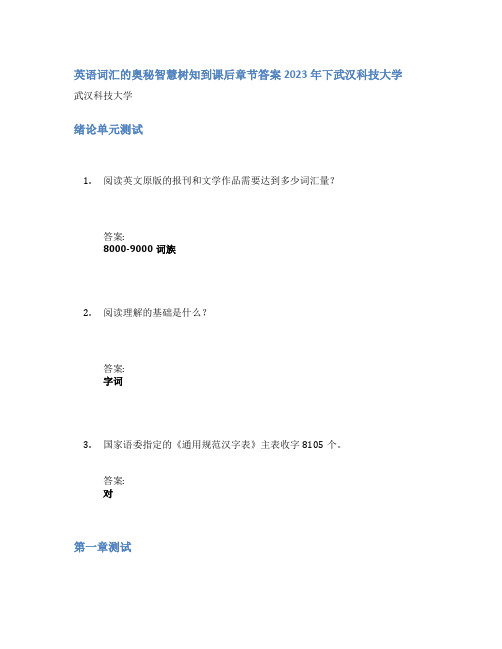
英语词汇的奥秘智慧树知到课后章节答案2023年下武汉科技大学武汉科技大学绪论单元测试1.阅读英文原版的报刊和文学作品需要达到多少词汇量?答案:8000-9000词族2.阅读理解的基础是什么?答案:字词3.国家语委指定的《通用规范汉字表》主表收字8105个。
答案:对第一章测试1.英语是英伦三岛的本土语言。
答案:错2.古英语阶段,英语中的外来语主要是法语。
答案:错3.中古英语阶段,英语单词的读音和拼写都产生了很大的改变。
答案:对4.诺曼征服后,为了更好地统治英国,法国统治者以英语为主要交流语言。
答案:错5.法语构词成分的进入,极大地增强了英语的构词能力。
答案:对6.英语中的词缀,都是英语本族语构词成分。
答案:错7.在现代英语早期阶段,英语就已经成为一门世界性的语言。
答案:错8.英语中的外来词源,主要是拉丁语、希腊语和德语。
答案:错9.英语中的外来语单词数量远远高于本族语单词数量。
答案:对10.(),标志着英语逐步走入正轨,确立其国语的正式地位。
答案:塞缪尔编纂的《英语词典》的问世11.中古英语阶段,法语对英语的影响主要表现在哪些方面?答案:改变英语单词的发音和拼写;简化英语单词的词尾;增加英语单词的同义表达;影响英语单词的词义12.下列哪些单词是外来语单词?答案:doctorate;longevity第二章测试1.英语中不可再分的语言单位是语素。
答案:对2.汉语中,“人”和单人旁“亻”都是语素,都表达“人”的基本含义。
答案:对3.语素变体是同一个语素的不同表现形式,表达不同的语义。
答案:错4.一个语素受其前后语素字母发音的影响,呈现出不同的变体形式。
答案:对5.可以独立做单词使用的语素叫自由语素。
答案:对6.词根是一个单词中最重要的语素。
答案:对7.曲折词缀附加在词基上,能够生成新的单词。
答案:错8.英语中的曲折词缀都是后缀,表示词的语法意义。
答案:对9.从构词的角度来说,nature、natural和naturalization在英语里算作3个不同的单词。
新东方破解英文单词的奥秘5

破解英文单词的奥秘52,C家族辅音转移从单词duke演变为词根duc,这里就涉及到了辅音通转三家族的C家族了,支的是,发音相似的c-k-g发生通转替换;而由于字母q和字母组合ch有时候也发K的音,因此C家族的全家福就是c —— k (q,ch)—— gK – g 转移han k er ['hæŋkə] v. 向往, 渴望, 期望hun g er [ˈhʌŋgə]n.饥饿;渴望vi.(for)渴望(得到)c lay [klei]n.粘土,泥土;*clay这个单词本身来自cling [kliŋ]vi.(to)紧紧抓(抱)住;挨近;依恋;坚持Cera – crae – clae = clay ;mic = make :陶瓷是用粘土制成的g lue [glu:] n.胶, 胶水, 胶粘物vt.粘贴, 紧附于(g-c通假)g lutinous ['glu:tinəs] adj. 粘性的, 胶状的stic k [stik]n.棍,手杖vt.刺;粘(钉,卡)住;留下sta k e [steik] n.桩, 赌注, 利害关系v.用桩支撑, 下注sta g ger ['stægə] vi.蹒跚, 犹豫,动摇vt.使摇晃, 使吃惊, 使犹豫n.蹒跚, 踌躇,摇摆不定vt.使交错,错开时间i ntri c ate ['intrikit] adj.复杂的, 难懂的Tric= trick [trik]n.诡计;诀窍;戏法vt.欺诈,哄骗intri g ue [in'tri:g] vt.欺骗,激起... 的兴趣vi.密谋n.阴谋, 复杂的事c ourt [kɔ:t]n.法庭,法院;球场;宫廷;庭院,院子g arden [ˈgɑ:dn]n.花(菜)园[ pl.]公园,园vi.从事园艺mar k[mɑ:k]n.痕迹;记号;mar g in ['mɑ:dʒin] n.边缘,页边空白, 定金vt.加边于space between a block of text and the edge of a pagemar g inal ['mɑ:dʒinəl] adj.边际的, 末端的, 仅以微弱多数获胜的, 微小的marginalize ['mɑ:dʒinəlaiz] vt. 使边缘化, 忽略, 排斥de c ade [ˈdekeid]n.十年,十年期de c ent ['di:snt] adj.相当好的, 体面的, 适当的, 正派的(―十‖全―十‖美)di g nity [ˈdigniti]n.庄严,端庄;尊严,高贵k in [kin] n. 家族, 亲属adj. 亲属关系的, 同类的suf. (接名词后)小的family, race, kind, natureg ene [dʒi:n]n.基因epo ch ['i:pɔk] n. 时期, 时代, 新纪元, 划时代的大事, <地质>世point marking the start of a new period in time ;If you refer to a long period of time as an epoch, you mean that important events or great changes took placeduring it. poch – page;e-开,翻开新的一页;pa g e [peidʒ]n.页,张k now [nəu]v.知道;认识co g n itive ['kɔgnitiv] adj.认识的, 认知的, 有认识力的co g n ition [kɔg'niʃən] n.认识, 认识力, 认知reco g n ize ['rekəgnaiz] vt.承认, 认出, 意识到, 表示感激c rea m [kri:m]n.奶油(食品);乳霜(膏) a.奶油色的m-milkg rea se [gri:s] n.油脂vt.用油脂涂, 上油, 贿赂(s-z=zhi脂)an ch or [ˈæŋkə]n.锚v.抛锚,停泊;(使)固定【有图】an g le [ˈæŋgəl]n.角or ch ard [ˈɔ:tʃəd]n.果园from wort "vegetable, plant root" + geard "garden, yard" (the word also meant "vegetable garden" until 15c.),g arden [ˈgɑ:dn]n.花(菜)园[ pl.]公园,园C-k 通转:c andle [ˈkændl]n.蜡烛k indle ['kindl] v.燃烧, 使... 着火, 激起, 发亮lu c re [ˈlu:kə] n.钱,利益l uck [lʌk]n.运气;好运,幸运c an [kæn,kən]aux. v.能;可以k een [ki:n] adj.敏锐的, 强烈的, 锋利的, 热衷的, 精明的v.(古)哭丧bold brave," later "clever, wise," from P.Gmc. *kan- "be able to" (see can).c an [kæn] n.罐头vt.罐装k ettle ['ketl] n.水壶, 坑穴(tea kettle水壶)k-c=can 罐头;ettle-ottle=bottlech –k 转移spee ch [spi:tʃ]n.说话,演说;言语,言论;说话方式spea k [spi:k]vi.说话;发言vt.说(出);讲(某种语言)brea ch [bri:tʃ] n.破坏;不和;缺口vt.攻破;破坏brea k [breik]n.休息vt.打破;弄坏vi.破碎;破晓;转晴blan ch [blɑ:ntʃ] v. 漂白, 变白, 使... 变白blan k [blæŋk]a.空白的;茫然的n.空白(处);空白表格sear ch [sə:tʃ] v.搜寻, 探求, 调查n.搜寻, 搜索, 调查see k [si:k]vt.寻找,追求Ch – qu 辅音转移ben ch [bentʃ]n.长凳,长椅banq u et ['bæŋkwit] n.宴会vi.参加宴会vt.宴请,设宴来自单词bench板凳,et小—— small bench;originally a snack eaten on a bench (rather than at table)li qu id ['likwid] adj. 液体的, 液态的n. 液体-id = fluidli qu or ['likə] n. 酒, 烈性酒, 液剂vt. 使喝醉, 给(皮革等)上油vi. 喝醉li ck [lik] v.舔, 轻拍, 击败, 掠过n.舔, 少许, 打, <口>速度3,D家族辅音转移前面讲了B,C家族,接下来讲D家族的全家福:t-d-th-sT-d 通转men t al [ˈmentl] a.精神的,心理的;精神病的;智力的min d [maind]n.头脑;智力;想法no t [nɔt]ad.不,没,不是nu d e [nju:d] a.裸体的n.裸体画denu d e [diˈnju:d] v.脱去,剥蚀,剥夺blun t [blʌnt] adj.钝的, 迟钝的, 直率的v.使迟钝, 变钝(―盲目‖故迟钝)blin d [blaind]a.瞎的;盲目的vt.使失明n.百叶窗(混合的东西―无法察觉辨识‖)t ame [teim] adj.驯服的, 柔顺的, 乏味的vt.驯养, 使驯服, 压制vi.变得驯服d omestic [də'mestik] adj.家庭的, 国内的, 驯养的n.佣人, 家仆cart oon [kɑ:'tu:n] n.卡通, 漫画, 草图vt.为 ... 画漫画来自单词card 卡纸。
(完整word版)英语10000词汇(附音标)
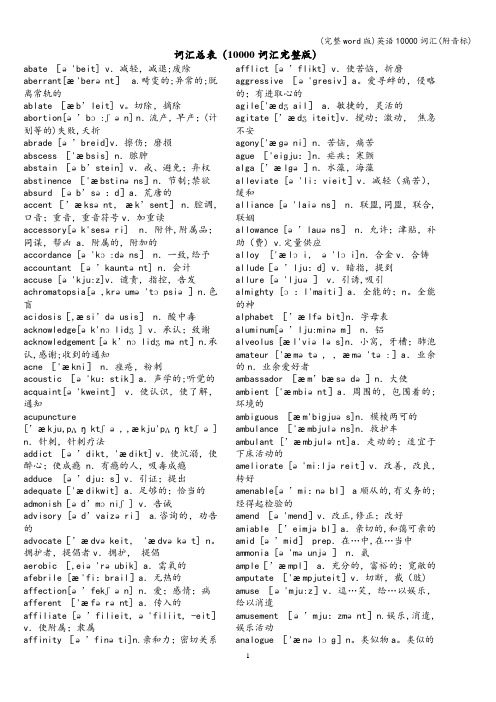
(完整word版)英语10000词汇(附音标) 词汇总表(10000词汇完整版)abate [ə'beit] v.减轻,减退;废除aberrant[æ'berənt] a.畸变的;异常的;脱离常轨的ablate [æb’leit] v。
切除,摘除abortion[ə’bɔ:ʃən] n.流产,早产;(计划等的)失败,夭折abrade [ə’breid]v.擦伤;磨损abscess ['æbsis] n.脓肿abstain [əb’stein] v.戒、避免;弃权abstinence ['æbstinəns]n.节制;禁欲absurd [əb’sə:d]a.荒唐的accent [’æksənt,æk’sent] n.腔调,口音;重音,重音符号v.加重读accessory[ək'sesəri] n.附件,附属品;同谋,帮凶 a.附属的,附加的accordance [ə'kɔ:dəns] n.一致,给予accountant [ə’kauntənt] n.会计accuse [ə'kju:z]v.谴责,指控,告发achromatopsia[ə,krəumə'tɔpsiə] n.色盲acidosis[,æsi’dəusis] n.酸中毒acknowledge[ək'nɔlidʒ] v.承认;致谢acknowledgement [ək’nɔlidʒmənt] n.承认,感谢;收到的通知acne ['ækni] n.痤疮,粉刺acoustic [ə'ku:stik]a.声学的;听觉的acquaint[ə'kweint] v.使认识,使了解,通知acupuncture[’ækju,pʌŋktʃə, ,ækju'pʌŋktʃə] n.针刺,针刺疗法addict [ə’dikt,'ædikt] v.使沉溺,使醉心;使成瘾 n.有瘾的人,吸毒成瘾adduce [ə’dju:s]v.引证;提出adequate['ædikwit] a.足够的;恰当的admonish[əd’mɔniʃ] v.告诫advisory [əd’vaizəri] a.咨询的,劝告的advocate[’ædvəkeit, 'ædvəkət] n。
英语词汇奥秘

英语词汇奥秘
英语词汇奥秘
英语是世界上使用最为广泛的语言之一,拥有丰富而多样的词汇。
每个词汇都承载着丰富的历史和文化内涵,揭示着人类语言发展的奥秘。
首先,英语词汇的奥秘在于它的起源。
英语的词汇有着多个来源,其中最主要的是拉丁语和古英语。
拉丁语是古罗马帝国的语言,影响了许多欧洲国家的语言,包括英语。
许多英语词汇,尤其是科学和学术领域的词汇,都来自拉丁语。
古英语则是英语的前身,它的词汇包括了很多描述自然、动物和生活的词汇。
通过了解英语词汇的起源,我们可以更好地理解词汇的含义和使用。
其次,英语词汇的奥秘在于它的多样性。
英语词汇取自各种不同的语言,包括法语、德语、荷兰语、意大利语等。
这些词汇的多样性使得英语成为一个非常灵活的语言,能够表达各种不同的意思和概念。
通过学习和掌握这些多样的词汇,我们可以更加准确地表达自己的思想和情感。
此外,英语词汇的奥秘还在于它的演变和变化。
英语是一门活的语言,它随着时间的推移不断变化和发展。
新的词汇不断被创造出来,旧的词汇也可能被淘汰或改变意义。
这种演变和变化是由于社会、科技、
文化等各个领域的进步和变革所带来的。
了解英语词汇的演变和变化,可以帮助我们保持与时俱进,更好地适应现代社会的需求。
总之,英语词汇背后蕴含着丰富的历史、文化和语言知识。
通过探索英语词汇的起源、多样性、演变和变化,我们可以更好地理解和运用英语,丰富自己的语言能力,并更好地与世界交流。
(完整word版)英语常用8000词汇表(单词带音标)

英语常用8000词汇表(带音标)CONTENTSPART 1 PREFIX 前缀PART 2 ROOTS IN SCENARIO 分场景词根Chapter 1. A和B的起源Chapter 2. 人体系列Chapter 3. 人体动作集锦Chapter 4.数学的奥秘Chapter 5.天文和地理Chapter 6.音乐的故事Chapter 7.法律PART 3 俞敏洪《词根词缀记忆法》剩余部分PART 4 重点辅音字母研究PART 5 APPENDIX 附录1.Months of the year2.Astrology3。
Greek Mythology4. Complementary Reading PassageWARMING—UPdebutinauguratecommenceembarkinitiatefact facile facility facilitatefac: benefactor<〉malefactor manufacturefec: defect/effect/perfect/infect〈〉immunizefic: efficient/proficient/sufficient/deficient/deficitNo words will suffice to convey my eagerness to V8000 inauguration。
PART 1 PREFIX 前缀1、a—加在单词或词根前面,表示"不,无,非"acentric/ ə'sentrik / a.无中心的(a+centric中心的)asocial/ ei'səuʃəl a好社交的(a+social好社交的)amoral / ə’mɔrəl / a非道德性的(a+moral道德的;注意:immoral不道德的)apolitical. 不关政治的(a+political政治的)2、ab-,abs-加在词根前,表示”相反,变坏,离去"等abnormal / æb’nɔ:məl / a反常的(ab+normal正常的)abuse / ə’bju:z / n。
